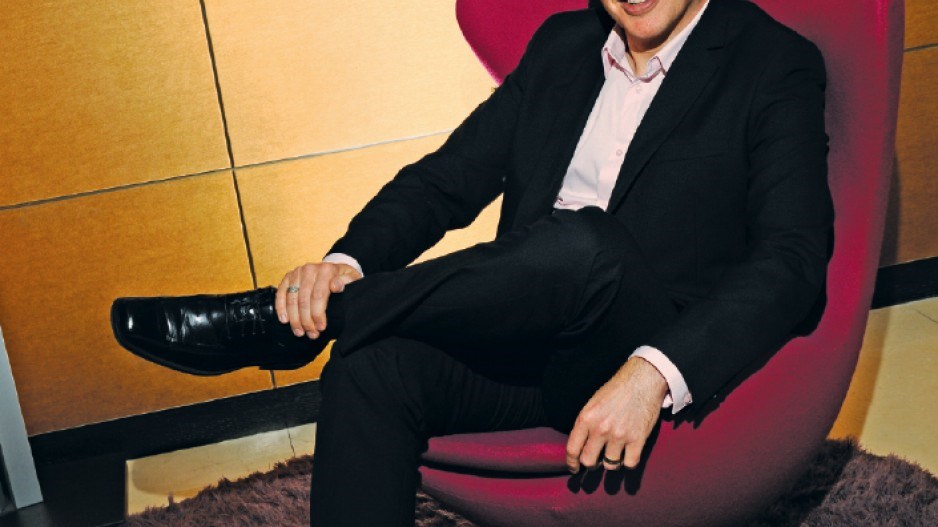From hip doormen in J. Crew uniforms and Fluevog wing-tipped dress shoes, to Billy, the virtual lifestyle concierge featured on iPads in every room, the stylish 96-room Opus Hotel in Yaletown is a custom alternative to big-box accommodation.
While such boutique hotels are in a class by themselves offering special services and amenities, they have a strong need to keep reinventing themselves or fall too close to the middle.
“We layer on all the enhancements like technology, decor, and the ability to infuse warmth with practicality,” said Opus general manager Nicholas Gandossi. “When you walk into one of our rooms, we want you to feel like your best friend just threw you the keys to stay for a few nights.”
The entertainment and fashion industry are key clients, with a still-strong U.S. market and a growing Canadian clientele since the recession.
“Toronto and Montreal, our feeder markets, play a large role. B.C. is a big driver for leisure travel,” Gandossi said. “Our occupancy rate is generally in the high 80s [per cent] and low 90s. If cruise ship and convention centre business click along at a good pace, every hotelier is happy.”
Flexibility is one of the hallmarks of a smaller hotel.
“I think any boutique GM will say that their competitive advantage is the ability to change on the fly,” Gandossi said. “We can be creative and innovative and allow the market to tell us what it needs, and then react.”
The Opus is creating partnerships with companies with similar needs – like J. Crew – to see how they can complement one another as well as focusing on Internet marketing to engage clients.
“We’re also diverting more resources to social media management. That online reputation will determine to a large extent, where the consumer chooses to go,” Gandossi says.
“People are trained and savvy. They’re looking for what the extras are.”
With 77 rooms, the boutique Loden Hotel also knows what it’s like to spread out resources without a big-chain budget while still providing specific amenities in the room for each guest.
Despite a tight economy, the Loden, which boasts floor-to-ceiling views of surrounding scenery from Coal Harbour, has managed to produce a steady 80% to 90% occupancy rate all year.
“We’re an independent hotel with the ability to shift our strategies quickly,” said general manager Michael Love. “Some properties wait for their corporate office, in whatever city, to help them change. Being a small boutique hotel, we can quickly respond and get to know each of our guests to customize their stay to their liking.”
The Loden opened in fall of 2008, at the height of the recession. Love says they haven’t cut any services but have added features like plug-and-play technology.
“It’s those little services that the guest wants, customized to each stay,” Love said. “What sets us apart is our colleagues’ passion to provide individualized customized service. It’s a tough time in our economy, but people still travel. You look after each guest, and they’ll keep coming back.”
The Oswego Hotel in Victoria is another sophisticated boutique property but caters to a niche long-stay market, with an urban-flavoured, 80-room suite hotel set close to the city’s inner harbour.
General manager Suzanne Gatrell forecasts the hotel occupancy rate will finish between 82% and 85% for July and August.
“It’s definitely a challenging year, more so than last year,” Gatrell said.
“We’re growing, but our mix is changing. Different types of people are coming, but everything is last-minute and harder to get this year. All hoteliers are feeling it.
“We get a lot of corporate and relocation business. The U.S. has continually been declining. We are now, as of the first quarter, seeing that rise again, coming up from the U.S. and Washington State,” she said.
While B.C. is the Oswego’s No. 1 source of corporate and transient guests, it appeals to international markets as well, from the U.K. and Australia, but Gatrell also noted that “those areas are softer than they have been.”
“We’ve now directed a lot of our marketing dollars to social media. We find that we’re getting more reservations through Twitter than we’ve seen in previous years,” Gatrell said.
“I feel it’s important to build what we are through word of mouth. It might seem like an archaic way of thinking, but it’s really important to build relationships and give a fantastic guest experience that people talk about.” •




